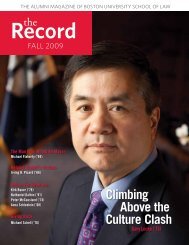the nature of representation: the cherokee right ... - Boston University
the nature of representation: the cherokee right ... - Boston University
the nature of representation: the cherokee right ... - Boston University
Create successful ePaper yourself
Turn your PDF publications into a flip-book with our unique Google optimized e-Paper software.
2005] THE NATURE OF REPRESENTATION 119<br />
to be a treaty negotiated at New Echota in 1835.” 147 In<strong>the</strong>samememorial,written<br />
two years after New Echota, Ross fur<strong>the</strong>r protested that Cherokees “are told that <strong>the</strong><br />
Executive has no discretion—has no power to disregard [<strong>the</strong> Treaty <strong>of</strong> New<br />
Echota], or to enter into any arrangement inconsistent with its provisions.” 148<br />
A critical observer might complain that Ross was exaggerating <strong>the</strong> U.S. position<br />
as held out to <strong>the</strong> Cherokees, for surely <strong>the</strong> U.S. government would not claim that<br />
discretion was out <strong>of</strong> <strong>the</strong> hands <strong>of</strong> <strong>the</strong> Executive. However, even Mason, when<br />
talking to <strong>the</strong> assembled Cherokee general council as a U.S. special agent,<br />
emphasized <strong>the</strong> same unalterable <strong>nature</strong> <strong>of</strong> <strong>the</strong> treaty from <strong>the</strong> U.S. standpoint:<br />
Their delegation was assured by <strong>the</strong> Executive, that this instrument is now<br />
become, by mutual acts <strong>of</strong> ratification, <strong>the</strong> law <strong>of</strong> <strong>the</strong> land, and cannot be<br />
altered at <strong>the</strong> will <strong>of</strong> ei<strong>the</strong>r party; that <strong>the</strong> President has no power over it, and<br />
that <strong>the</strong> constitution <strong>of</strong> <strong>the</strong> United States makes it his imperative duty to cause<br />
it to be executed. 149<br />
“The President has no power over it” is a strong statement <strong>of</strong> <strong>the</strong> fixed status <strong>of</strong> <strong>the</strong><br />
New Echota Treaty as a valid instrument. The U.S. position, though made for <strong>the</strong><br />
purposes <strong>of</strong> Cherokee removal, was and has been that <strong>the</strong> New Echota Treaty is<br />
unalterable, and this should continue to hold when <strong>the</strong> Cherokees invoke <strong>the</strong> treaty<br />
for <strong>right</strong>s guaranteed <strong>the</strong>m by <strong>the</strong> same instrument.<br />
C. Intent <strong>of</strong> Delegate Provision<br />
The New Echota Treaty provisions, including Article 7’s delegate <strong>right</strong>, were<br />
deliberate grants made by <strong>the</strong> U.S. government under no duress or imposition from<br />
Cherokee factions at <strong>the</strong> time <strong>of</strong> <strong>the</strong> Treaty’s acceptance. 150 Indeed, Article 7 might<br />
be best thought <strong>of</strong> as a form <strong>of</strong> payment for <strong>the</strong> land cession <strong>of</strong> which <strong>the</strong> bulk <strong>of</strong> <strong>the</strong><br />
Treaty consists, a <strong>right</strong> granted in consideration for <strong>the</strong> taking <strong>of</strong> Cherokee lands in<br />
147<br />
Memorialfrom John Ross et al. to Congress, Jan. 15, 1838, 2nd Sess., H.R. Doc.<br />
No. 99, at 2 (1838) micr<strong>of</strong>ormed on CIS No. 325-H99 (Cong. Info. Serv.).<br />
148<br />
Id.<br />
149<br />
J. Mason, Jr., Address to <strong>the</strong> Cherokee nation in generalcounsel assembled, supra<br />
note 96, at 6.<br />
150<br />
Richard Mack Bettis, Introduction, in ROYCE, supra note 2, at xi (“Each treaty is<br />
unilateral, however, in <strong>the</strong> sense that <strong>the</strong> [Cherokee] Tribe really had no choice.”). See<br />
also, PRUCHA, supra note 17, at 160 (citing Rev. Isaac McCoy, a Baptist missionary to<br />
<strong>the</strong> Indians, in UNITED STATES’TELEGRAPH:<br />
We cannot consider <strong>the</strong> Indians really a party to a contract in <strong>the</strong> conveyance <strong>of</strong><br />
land when <strong>the</strong>y are assembled at <strong>the</strong> pleasure <strong>of</strong> <strong>the</strong> whites, when <strong>the</strong> latter give <strong>the</strong><br />
terms, and when <strong>the</strong> latter are as fully determined to have <strong>the</strong> land in question, or,<br />
ra<strong>the</strong>r, to hold <strong>the</strong> land in question, to which <strong>the</strong>y already consider <strong>the</strong>mselves<br />
entitled, if <strong>the</strong> terms <strong>of</strong>fered to <strong>the</strong> Indians should not be agreed to, as if <strong>the</strong>y<br />
should.).









